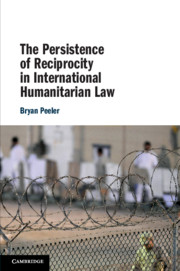Refine search
Actions for selected content:
12 results
Circulating Violence: Guerre contre-révolutionnaire as the Intellectual Foundation of Modern Torture
-
- Journal:
- Comparative Studies in Society and History , First View
- Published online by Cambridge University Press:
- 17 October 2025, pp. 1-27
-
- Article
-
- You have access
- Open access
- HTML
- Export citation
Pendulum swings rather than paradigm shifts: Southeast Asia’s securitisations and the global war on terror
-
- Journal:
- European Journal of International Security / Volume 10 / Issue 1 / February 2025
- Published online by Cambridge University Press:
- 15 November 2024, pp. 60-77
-
- Article
-
- You have access
- Open access
- HTML
- Export citation
Pediatric Blast Trauma: A Systematic Review and Meta-Analysis of Factors Associated with Mortality and Description of Injury Profiles
-
- Journal:
- Prehospital and Disaster Medicine / Volume 37 / Issue 4 / August 2022
- Published online by Cambridge University Press:
- 23 May 2022, pp. 492-501
- Print publication:
- August 2022
-
- Article
-
- You have access
- Open access
- HTML
- Export citation
7 - The Middle East and the Global War on Terror (2001–2011)
-
- Book:
- International Relations in the Middle East
- Published online:
- 28 January 2021
- Print publication:
- 25 February 2021, pp 161-182
-
- Chapter
- Export citation
12 - A Perfect Storm
-
- Book:
- Israeli Foreign Policy since the End of the Cold War
- Published online:
- 15 December 2020
- Print publication:
- 17 December 2020, pp 262-282
-
- Chapter
- Export citation
Enter 9/11: Latin America and the Global War on Terror
-
- Journal:
- Journal of Latin American Studies / Volume 52 / Issue 3 / August 2020
- Published online by Cambridge University Press:
- 04 June 2020, pp. 545-573
- Print publication:
- August 2020
-
- Article
-
- You have access
- Open access
- HTML
- Export citation
5 - Conclusions
-
- Book:
- The Law of the List
- Published online:
- 24 April 2020
- Print publication:
- 23 April 2020, pp 305-331
-
- Chapter
- Export citation
5 - The Expectation of Reciprocity and the GWOT
-
- Book:
- The Persistence of Reciprocity in International Humanitarian Law
- Published online:
- 03 October 2019
- Print publication:
- 24 October 2019, pp 128-168
-
- Chapter
- Export citation
1 - Introduction
-
- Book:
- The Persistence of Reciprocity in International Humanitarian Law
- Published online:
- 03 October 2019
- Print publication:
- 24 October 2019, pp 1-11
-
- Chapter
- Export citation

The Persistence of Reciprocity in International Humanitarian Law
-
- Published online:
- 03 October 2019
- Print publication:
- 24 October 2019
1 - Are We at War? What Do We Want? And Do We Want to Win?
-
- Book:
- Why America Loses Wars
- Published online:
- 09 August 2019
- Print publication:
- 29 August 2019, pp 1-19
-
- Chapter
-
- You have access
- HTML
- Export citation
Introducing the International Theory of Carl Schmitt: International Law, International Relations, and the Present Global Predicament(s)
-
- Journal:
- Leiden Journal of International Law / Volume 19 / Issue 1 / March 2006
- Published online by Cambridge University Press:
- 18 April 2006, pp. 1-7
-
- Article
- Export citation
